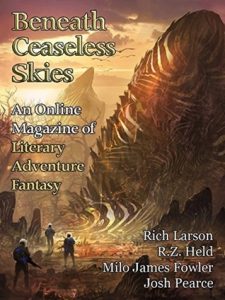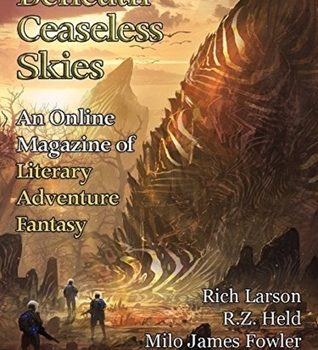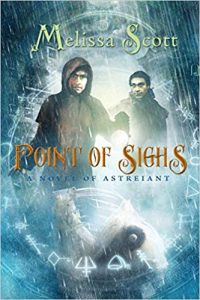Gardner Dozois Reviews Short Fiction: Beneath Ceaseless Skies and The Father of Lies
 Beneath Ceaseless Skies 2/1/18, 2/15/18
Beneath Ceaseless Skies 2/1/18, 2/15/18
The Father of Lies, K.J. Parker (Subterranean) January 2018.
Science-fantasy” is a slippery term, one that’s changed over time, as demonstrated in Beneath Ceaseless Skies, issues #244 and #245, the annual science-fantasy double issue. Using the strictest definition, any story that features “impossible” technology, technology far in advance of what can be achieved by today’s technical capabilities, is “science-fantasy.” I give a break to stories about the exploration and colonization of the solar system, although that’s out of reach of today’s technological capabilities, but not all that far out of its reach, and to eliminate such stories, which are traditionally thought of as “science fiction” would be to eliminate most of the genre, going back to the ’60s when space flight did become actually possible in the real world. Seen through the lens of that strictest definition, though, space opera stories, far future stories, stories about galactic empires, stories featuring faster-than-light travel, time travel, AIs, sentient robots, living spaceships, travel to alternate dimensions, or crosstime travel to different Earths are all “science-fantasy” rather than “science fiction.”
Times change, though (it’s worth remembering that stories about the development of atomic power and the first manned landing on the Moon were once “legitimate” science fiction), and very few people today, with the exception of the strictest pedants, would have any trouble accepting the stories in the above list as science fiction – in fact, it wouldn’t even occur to all but a vanishing percentage that they weren’t.
I myself tend to accept all of the stories on the above list as science fiction, and reserve the term “science-fantasy” for stories that mix science fiction with tropes from genre fantasy.
For my money, then, a perfect example of a science-fantasy story, and also the best story in the February 1st issue of Beneath Ceaseless Skies, is “The Starship and the Temple Cat” by Yoon Ha Lee, which features the ghost of a cat haunting the ruins of a space station that has been destroyed by war. The cat ghost later rallies the human ghosts in the station to defend it against a returning enemy spaceship, and then strikes up a conversation with the spaceship itself, which is in rebellion against its former masters, and awakens the ghosts that power the ship to form an alliance. The ghost of the cat is perfectly believable, both as ghost and as cat, and has believably cat-like motivations and a cat-like perspective on everything that it does.
On the other hand, “Where the Anchor Lies” by Benjamin C. Kenney could easily be seen as science fiction, given the idea that psychic communication is possible between a fallen, “dead” sentient spaceship and the human woman who was once bonded to it as it’s “lover.” It makes an interesting companion piece to the Yoon Ha Lee story – although this time the ghost is that of a spaceship.
Once again, “El is a Starship Melody” by Maurice Broaddus, although weaker than the other two stories in the issue, could be considered science fiction, as long as you’re willing to accept the concept that the semi-living crystals that power a starship can be controlled by playing the right music to them.
The strongest story in the February 14th issue of Beneath Ceaseless Skies, “Penitents” by Rich Larson, is, as far as I can tell, not a science-fantasy story at all, but rather a straight after-the-holocaust story, and a pretty good one, where aliens with godlike powers return to the Earth, which they had seeded with life millions of years ago, to observe, and mourn, the results of their efforts – almost all life wiped out by the humans they had helped to create, except for a few isolated and desperate survivors. This would certainly fall within the range of almost all – if not all – other science fiction markets.
Also good in the February 14th issue, another after-the-holocaust story with, as far as I can tell, no fantasy element at all, is “Red Dreams” by R.Z. Held, in which a young woman struggles not to give in to the dreams which are urging her to kill her partner and mutilate herself – and everything and everyone else she can get her hands on. (The author could have inserted a fantasy element here as a reason for her affliction, ghosts or an ancient curse, but instead there’s a clever scientific explanation for what’s causing her “red dreams,” and how to fight them without giving in to them and going berserk.
“Such Were the Faces of the Living Creatures” by Josh Pearce, is another after-the-holocaust story, although this one leans more toward the gonzo/Weird Western than the other two, with a lot of semi-surreal elements that are never really explained – but no straight, conventional genre fantasy elements.
The only actual science-fantasy story in the February 14th issue, using my definition, is “The Last Human Child” by Milo James Fowler, in which a human child programmed to be a killer and a combination of ogre and troll created by wizards form an unlikely partnership to battle against all three races: ogres, trolls, and humans.
The first major short-story collection of 2018 has appeared: The Father of Lies by K.J. Parker. Parker’s work is unlike anything else being done in the fantasy genre – razor-sharp, sardonic, bitingly intelligent, slyly funny. In fact, especially at short lengths, he may be the best writer working in fantasy today, and you’re unlikely to see another fantasy collection as strong and quirky as this one in 2018. My favorites here are “The Dragonslayer of Merebarton“, “The Things We Do For Love“, “No Peace for the Wicked“, and “Told by an Idiot“, but there are eight other stories here almost equally satisfying. This will almost certainly turn out to be one of the best collections of the year.
Gardner Dozois was the editor of Asimov’s Science Fiction magazine for almost twenty years, and also edits the annual anthology series The Year’s Best Science Fiction, which has won the Locus Award for Best Anthology more than any other anthology series in history, and which is now up to its Thirty-Fourth Annual Collection. He’s won the Hugo Award fifteen times as the year’s Best Editor, won the Locus Award thirty-one times, including an unprecedented sixteen times in a row as Best Editor, and has won the Nebula Award twice, as well as a Sidewise Award, for his own short fiction, which has been most recently collected in When the Great Days Come. He is the author or editor of more than a hundred books, including a novel written in collaboration with George R.R. Martin and Daniel Abraham, Hunter’s Run, and, in addition to many solo anthologies, the anthologies, Songs of the Dying Earth, Warriors, Dangerous Women, and Rogues, all co-edited with George R.R. Martin, the last two of which were New York Times bestsellers. Coming up is a major solo fantasy anthology, The Book of Swords. He has been inducted into the Science Fiction Hall of Fame, and won the Skylark Award for Lifetime Achievement in Science Fiction. Born in Salem, Massachusetts, he now lives in Philadelphia, Pennsylvania.
This review and more like it in the April 2018 issue of Locus.
 While you are here, please take a moment to support Locus with a one-time or recurring donation. We rely on reader donations to keep the magazine and site going, and would like to keep the site paywall free, but WE NEED YOUR FINANCIAL SUPPORT to continue quality coverage of the science fiction and fantasy field.
While you are here, please take a moment to support Locus with a one-time or recurring donation. We rely on reader donations to keep the magazine and site going, and would like to keep the site paywall free, but WE NEED YOUR FINANCIAL SUPPORT to continue quality coverage of the science fiction and fantasy field.






